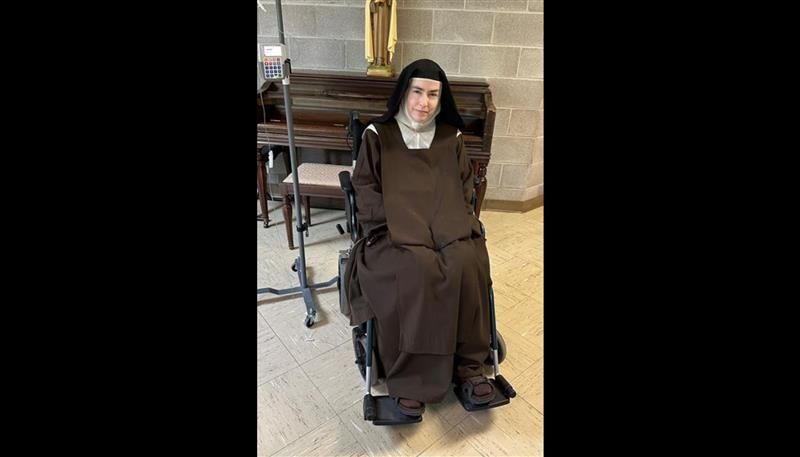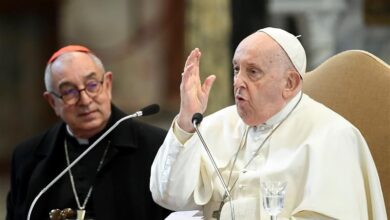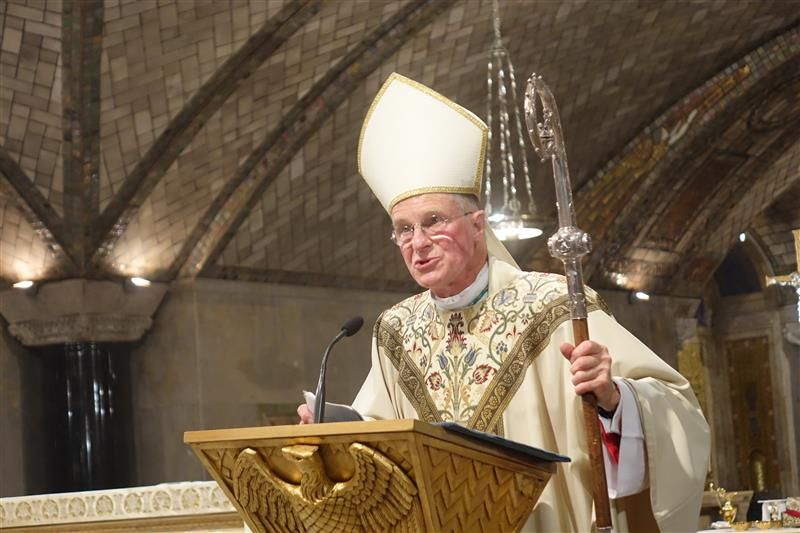Bishop: Texas nuns may have excommunicated themselves with defiant letter
 The Reverend Mother Superior Teresa Agnes Gerlach of the Monastery of the Most Holy Trinity in Arlington, Texas. / Credit: Monastery of the Most Holy Trinity Discalced Carmelite Nuns
The Reverend Mother Superior Teresa Agnes Gerlach of the Monastery of the Most Holy Trinity in Arlington, Texas. / Credit: Monastery of the Most Holy Trinity Discalced Carmelite Nuns Washington, D.C. Newsroom, Aug 21, 2023 / 16:05 pm (CNA).
Bishop Michael Olson of the Diocese of Fort Worth, Texas, said a Carmelite prioress and several other nuns at a Texas monastery may have excommunicated themselves by publishing a statement challenging his authority and banning him from setting foot on monastery grounds.
In an Aug. 19 statement published by the Diocese of Fort Worth, Olson said that because the Monastery of the Most Holy Trinity’s prioress, Mother Teresa Agnes Gerlach, “issued a public statement on the website of the Arlington Carmel by which she publicly rejected my authority as diocesan bishop and pontifical commissary,” he felt compelled to “inform the faithful of the Diocese of Fort Worth that Mother Teresa Agnes, thereby, may have incurred upon herself latae sententiae, (i.e., by her own schismatic actions), excommunication.”
Besides Gerlach, Olson said that “depending on their complicity in Mother Teresa Agnes’ publicly, scandalous, and schismatic actions,” other nuns at the monastery “could possibly have incurred the same latae sententiae excommunication.”
What did the nuns say?
The monastery’s statement referenced by Olson was published on Holy Trinity’s website homepage on Aug. 18. In it, the nuns declare themselves independent of Olson’s authority and appear to want to cut all ties with the bishop.
“Because the salvation of our souls is our first duty before Almighty God, in order to protect the integrity of our monastic life and vocation from the grave dangers that the continued abuse to which we are being subjected threaten, we hereby state that, in conscience, we no longer recognize the authority of, and can have no further relations with, the current bishop of Fort Worth or his officials,” the statement said.
The nuns further “forbid” the bishop and diocesan officials “to enter our monastery property or to have any contact or relations with the monastery or any of its nuns or novices.”
“No one who abuses us, as has the current bishop of Fort Worth, has any right to our cooperation or obedience,” the nuns’ statement said.
How did it come to this?
This is the latest development in an increasingly bitter dispute between the Fort Worth bishop and nuns at the Most Holy Trinity Monastery in Arlington, Texas, over an alleged sexual affair between the prioress and a North Carolina priest, Father Philip Johnson.
Olson first launched a canonical investigation into the affair in April. After being appointed pontifical commissary and being given full authority in the matter by the Vatican’s Dicastery for Institutes of Consecrated Life and Societies of Apostolic Life, Olson proclaimed Gerlach guilty of having violated the Sixth Commandment and her vow of chastity and dismissed her from religious life.
The monastery has denied Gerlach committed any wrongdoing and filed a civil suit against Olson for theft, defamation, and abuse of power. The suit was thrown out without comment by Tarrant County District Court Judge Don Cosby on June 30.
After their case was dismissed, the monastery’s attorney, Matthew Bobo, told CNA that they would be appealing.
As of now, the monastery continues to claim Gerlach has not committed any wrongdoing warranting her dismissal.
“In respect of the calumnies that have been published,” the nuns said in their Aug. 18 statement, the monastery wanted to “express its complete confidence in the personal and moral integrity of its Mother Prioress and in her leadership.”
What does it mean to be excommunicated?
Though both sides of the dispute have alleged abuse and bad faith, this is the first mention of excommunication.
Excommunication is the separation of an individual from communion with God and his Church and ultimately removes the possibility of the promise of heaven until one repents. It is the most grave matter possible for a Catholic.
Latae sententiae excommunication means that rather than a bishop or ecclesial authority formally declaring a person excommunicated, the individual automatically excommunicates himself or herself by his or her actions. Examples of latae sententiae excommunication include the sins of preaching heresy, breaking the seal of confession, or participating in an abortion. To be excommunicated, one must be fully aware that he or she is committing a grave error and willingly chooses to do so of his or her own free will.
For an ecclesial figure such as Olson to issue a public statement pronouncing someone has been latae sententiae excommunicated is very rare.
Monastery denies breaking communion
In the monastery’s website statement, the nuns said that though they “expect much rhetoric to the contrary” they “are breaking communion with no one.”
“We are simply stating that the abuse to which we have been subjected is so gravely unjust and intolerably destructive of the vocation to which we are vowed before Almighty God, that in conscience that abuse cannot be cooperated with,” the nuns said. “This is no rejection of any article of Catholic faith or morals. Rather, it is a statement that, in these particular and peculiar circumstances, in conscience before Almighty God, we cannot permit this diocesan bishop to continue his abusive behavior towards us any longer.”
Though Olson’s Aug. 19 statement said the Arlington monastery “remains closed to public access until such time as the Arlington Carmel publicly disavows itself of these scandalous and schismatic actions of Mother Teresa Agnes,” the nuns have declared their monastery chapel is open to visitors.
“Our monastery chapel is and shall remain open to all who, in good faith, wish to pray there or to participate in the liturgical rites we celebrate, regardless of any protestations that those who have abused us may wish to make in this respect,” their statement said.
Pat Svacina, a representative for the Fort Worth Diocese, shared a statement with CNA Monday that said that before the statement went up on the monastery’s website neither Olson nor the diocese had prior notification of the monastery’s “dangerously rebellious decision by the dismissed prioress and the other nuns to reject formally the canonical authority of their superior, the pontifical commissary as appointed by the Holy See.”
“Bishop Olson asks the faithful of the Diocese of Fort Worth and all people of goodwill to pray for the Carmelites that they will stop their open disobedience,” the diocesan statement said, adding that “Olson and the Diocese of Fort Worth stand with Pope Francis and will remain faithful to the canonical process that is currently underway.”
This is not the only controversy involving Olson. Currently, there is a petition with more than 900 signees by a group known as “Laity in Unity” asking Archbishop Christophe Pierre, the apostolic nuncio to the U.S., to remove Olson from his episcopal office. The petition alleges Olson “operated against canon law on numerous occasions and has employed abusive language and vindictive actions against priests, nuns, and the lay faithful in our diocese.”
The monastery could not be reached for comment by the time of publication. According to the monastery website, the nuns will be in a retreat Aug. 20–27.





